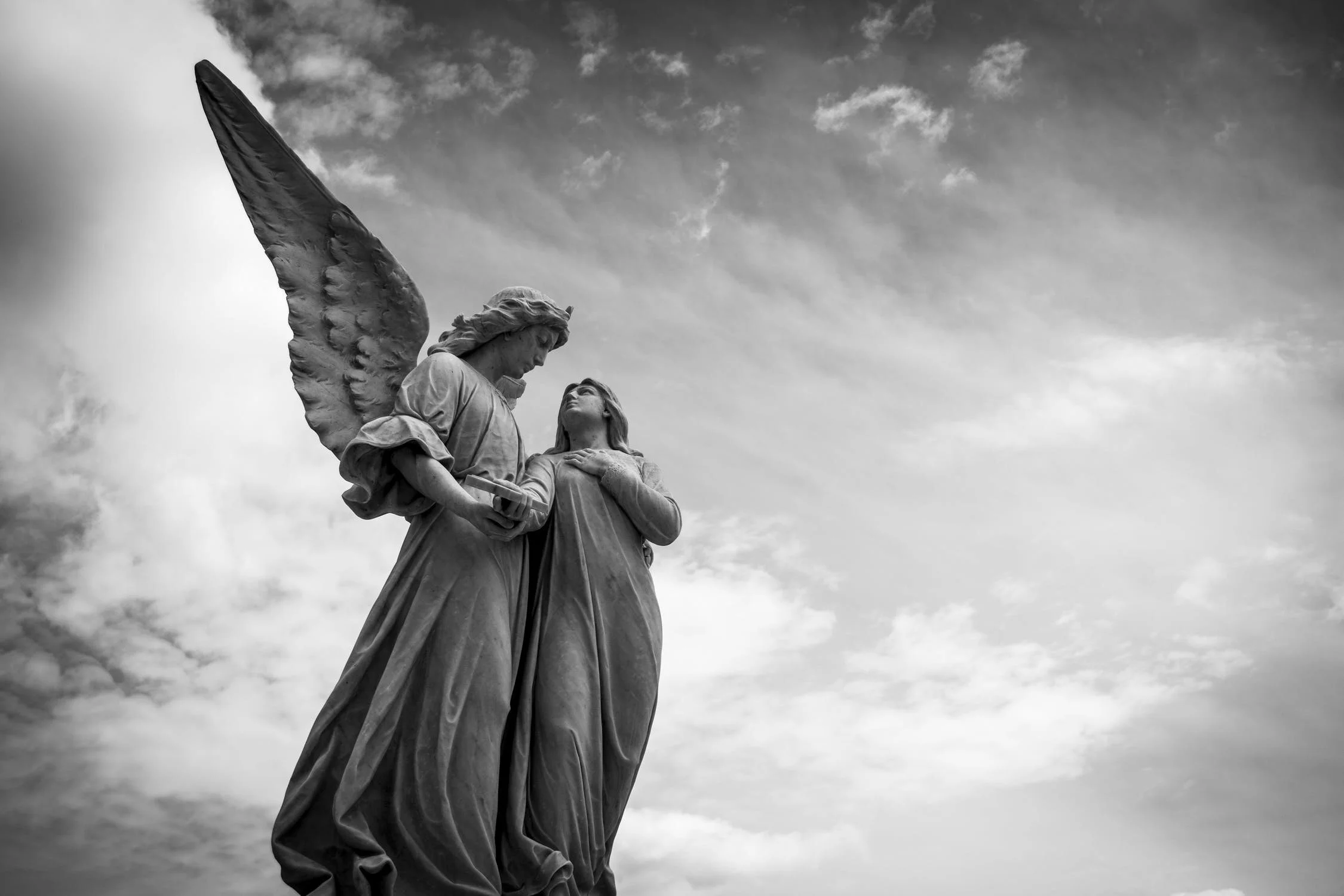Who is the Holy Spirit?
This week we want to share with you an important though sometimes neglected person: the Holy Spirit. We believe that the Holy Spirit is the eternal third person of the Trinity, coequal with God the Father and God the Son, who is actively at work in the world today, convicting unbelievers of sin, saving men, and bringing them unto completion.
In the Trinity
The Person of the Holy Spirit
The Holy Spirit is the third person of the Trinity. His divinity is shown in His equality with the Father and the Son (Matt. 28:19; 1 Cor. 12:4-6; 2 Cor. 13:13), by His name, Spirit of God (Rom. 8:14-16), that He fully knows the thoughts of God (1 Cor. 2:10-11), His holiness (Luke 11:13), and by His works of inspiring (2 Pet. 1:21), regeneration (John 3:5-6), and sanctification (2 Thess. 2:13). He is a person with intellect (1 Cor. 2:10-11), will (1 Cor. 2:11), and emotion (Isa. 63:10; Gal. 4:6; Eph. 4:30). The personal title Paraclete is given Him (John 14:16; 26; 15:26; 16:7). He does personal works of teaching (John 14:26; 1 Cor. 2:13), guiding, hearing and speaking (John 16:13; Rom. 8:16) as well as loving (Rom. 15:30).
The Work of the Holy Spirit
The Holy Spirit was a participant in creation (Gen. 1:2, 26), generating life and carrying creation to its completion (Job 33:4; Ps. 104: 29-30; Is. 42:5). He was active in empowering and inspiring believers in Old Testament times (Num. 11:26-29; 24:2; Judg. 14:6; 1 Sam. 10:6; Neh. 9:30). He was with Jesus at His baptism (Matt. 3:16-17) and throughout His earthly ministry (Matt. 4:1). He inspired the authors of Scripture (2 Pet. 1:20-21).
He is called the Spirit of grace (Zech. 12:10) because He effects redemption, calling all persons to salvation (Rev. 22:17). He convicts the world of sin, righteousness and judgment (Gen. 6:3; John 16:8-11), calls (2 Tim. 1:9), regenerates (Titus 3:5-6), baptizes people into Christ's body at conversion (Rom. 6:3-4; 1 Cor. 12:13) and seals (Eph. 1:13-14).
The Spirit indwells the believer at the new birth (1 Cor. 6:19) and never departs (Rom. 8:9). He fills and empowers believers in proportion to their receptiveness (Rom. 6:13; Gal. 5:16; Eph. 5:18). He sanctifies (Rom. 15:16; 1 Pet. 1:2), produces fruit (Gal. 5:22-23), empowers (Acts 1:8), assures (Rom. 8:16-17), teaches (John 16:12-15), prays (Rom. 8:26), and gives gifts, including people, talents, supernatural abilities, and spiritual endowments, to equip the church to carry out its purpose (Rom. 12:6-8; 1 Cor. 12:4-11; Eph. 4:11-12). Apostles and prophets had a unique role in forming the church (Eph. 2:20) and are present to the church today through Scripture. The Spirit can give distribute all gifts today. It is our responsibility to ensure that gifts are biblical and used in biblical ways (1 Cor. 14:39; 1 Thess. 5:19-22; 1 John 4:1-4).
In the Godhead
The Person of the Holy Spirit
The Holy Spirit is the third person of the Godhead (Matt. 28:19; 2 Cor. 13:14). He is thus a fully divine being (Acts 5:3-4; 1 Cor. 2:10-11), coequal and coeternal with the Father and the Son, and possessing all the attributes of deity including but not limited to being present everywhere (Ps. 139:7-12), all knowing (1 Cor. 2:10-11), and powerful (Rom. 15:13, 19). He is also a fully personal being having emotions (Eph. 4:30), a mind (Rom. 8:27), and a will (1 Cor. 12:11) and performing personal activities like teaching (John 14:26), helping (John 15:26), and convicting (John 16:8).
The Work of the Holy Spirit
In the time prior to the incarnation, the Holy Spirit was active with the Father and the Son in creation (Gen 1:2, 26; Job 26:13) and revelation (2 Pet. 1:21). He also empowered Old Testament believers for ministry (Jdg. 6:34; 1 Sam. 16:13) and prophecy (1 Sam. 10:10-11; 2 Ki. 2:9-15).
In the life and ministry of Jesus, He was involved in Jesus' conception (Matt. 1:18, 20) and baptism (Matt. 3:16-17). The Spirit also guided him (Matt. 4:1; Mark 1:12) and empowered him for ministry (Matt. 12:28; Acts 10:38). While ministering to the church, he seeks to glorify Jesus in everything (John 16:13-14).
In the lives of unbelievers, the Spirit is active in convicting the entire world of their sinful state before God and the coming of judgment (John 16:8).
In the lives of individual believers, the Spirit indwells every believer at conversion (John 14:17; 1 Cor. 6:19) and incorporates them into the Body of Christ (1 Cor. 12:13; Gal. 3:27), sealing them as a guarantee of their relationship to God, their future inheritance, and their eternal salvation (Eph. 1:13-14; Rom. 8:14-16) and beginning the process of sanctification (Titus 3:5; 1 Pet. 1:2). This Spirit-baptism is the one-time universal experience of all believers (1 Cor. 12:13). Subsequent to this initial baptism, believers can also experience the continual filling of the Spirit (Eph. 5:18) whereby he empowers them for service and godly living (Acts 1:8; Gal. 5:22-25), provides assurance of salvation (Rom. 8:15), guides (Rom. 8:14), teaches (John 16:13), illumines (1 Cor. 2:12-15), and comforts them (Acts 9:31). This filling can be facilitated through obedience and prayer or be hindered through sin (Gal. 5:16-26). The gifts of the Spirit are either special or natural endowments (Rom. 12:6-8; 1 Cor. 12; Eph. 4:11-12) which the Spirit gives to every believer (1 Cor. 12:7) to serve other people (1 Pet. 4:10). These gifts can be given at birth (natural gifts), conversion (Acts 2:4), or at some subsequent time (1 Cor. 12:31) and are to be used in a controlled manner (1 Cor. 14:1-33). The Spirit distributes these gifts as he wills (1 Cor. 12:9) and though he could choose to stop providing a particular gift there is no reason to suppose that he has.
In the Church the Spirit promotes unity (1 Cor. 12:4-27) and fellowship (2 Cor. 13:14; Phil. 2:1). He also empowers the Church for worship (1 Cor. 14:15) and ministry (Acts 1:5, 8).
Co-Equal with Father and Son
The Person of the Holy Spirit
The Holy Spirit is the third person of the Trinity, co-equal and consubstantial with God the Father and God the Son (Matt. 28:19; Acts 5:3-4), proceeding forth from both the Father and Son (John 15:26). He is a distinguishable person having intellect (1 Cor. 2:10-11), emotions (Eph. 4:30), and will (Acts 16:6; 1 Cor. 12:11).
The deity of the Holy Spirit is established by direct assertion (Acts 5:3-4). His deity is also established by His association with the Godhead (Matt. 28:19; 1 Cor. 12:4-7; 2 Cor. 13:14). His deity is further demonstrated by His divine name, the Spirit of God (1 Cor. 6:11), and the Holy Spirit (1 Cor. 6:19). His deity is further yet demonstrated by His divine attributes: omniscience (John 14:26; 1 Cor. 2:11-12), omnipresence (Psa. 139:7-10), omnipotence (Luke 1:35-37), and eternality (Heb. 9:14). Finally, His deity is demonstrated by his divine activity in creation (Gen. 1:2), in the inspiration of scripture (2 Pet. 1:21), and in the regeneration and sanctification of believers (John 3:5-6; 2 Thess. 2:13).
The Work of the Holy Spirit
The Holy Spirit was actively working in the Old Testament. He is presented as the creative agent of God, not only in creating the world (Gen. 1:2), but also in imparting creative ability to men for special tasks (Ex. 31:1-4). The Holy Spirit is also seen setting apart and empowering men for leadership as kings and judges (Num. 11:17; 27:15-18; 1 Sam. 10:6-7). The Spirit caused people to prophesy, both speaking forth (Num. 24:2-3) and inscripturating God's word (2 Pet. 1:21). This ministry of the Holy Spirit upon or in people was most often temporary (1 Sam. 16:14; Psa. 51:11).
Holy Spirit was actively working in the life of Jesus Christ. He caused Christ's conception within the Virgin Mary (Luke 1:35). The Spirit was present at His baptism (Matt. 3:16), anointing Jesus (Luke 4:18), empowering Him in His ministry (Luke 4:14) and even raising Him from the dead (Rom. 8:11).
The Holy Spirit is actively working today. He is convicting the world of sin, righteousness and judgment (John 16:7-8). He is active in the regeneration of men and women (John 3:3-6, Titus 3:5), at that moment of change baptizing each believer into the body of Christ (1 Cor. 12:12-14), indwelling them permanently (Ezek. 36:27; John 14:17; Rom. 8:9; 1 Cor. 6:19-20) and sealing them for eternity (Eph. 1:13-14). He is active in the sanctifying of believers (2 Thess. 2:13; 1 Pet. 1:2). He fills believers as they cooperate with Him (Eph. 5:18), empowering them for righteous living and service (Acts 1:8; Gal. 5:22-23; Eph. 3:16). He gives spiritual gifts for the edification of the body of Christ to all believers (1 Cor. 12:4-11; 1 Pet. 4:10). The sign gifts are marks of the apostles (Acts 2:43; 2 Cor. 12:12; Rom. 15:18-19) and have ceased with the death of the apostles and the closure of the canon of Scripture (1 Cor. 13:8-10). He gives assurance of salvation to believers (Rom. 8:16), intercedes on their behalf (Rom. 8:26-27), and provides illumination, teaching them the things of God (John 16:13; 1 Cor. 2:12-14; 1 John 2:27).












